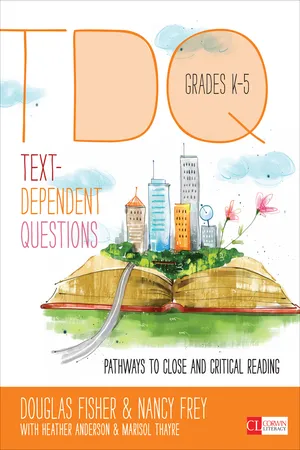
Text-Dependent Questions, Grades K-5
Pathways to Close and Critical Reading
- English
- ePUB (mobile friendly)
- Available on iOS & Android
Text-Dependent Questions, Grades K-5
Pathways to Close and Critical Reading
About this book
Fisher & Frey's answer to close and critical reading No doubt since the cave paintings of prehistoric times, humans have asked questions to make sense of the message. So what could possibly be new about posing questions about text? Plenty... and with TDQ, Doug Fisher and Nancy Frey reveal it all. After one quick read, you will have learned all the very best ways to use text-dependent questions as scaffolds during close reading... and the big understandings they can yield, especially when executed the Fisher and Frey way. But that's just for starters. Fisher and Frey also include illustrative video, recommended texts and questions, examples from across content areas, and an online professional learning guide, making the two volumes of TDQ a potent professional development tool across all of K-12. The genius of TDQ is the way Fisher and Frey break down the process into four cognitive pathways that help teachers "organize the journey through a text" and frame an extended discussion around it. Step by step, this approach ensures that in every close reading lesson, students are guided to consider explicit and implied meanings, and deeply analyze and appreciate various aspects of a text, especially those that may be challenging or confusing. Here's how the four inter-related processes play out, with every why and every how answered:
- What does the text say? (general understandings and key details)
- How does the text work? (vocabulary, structure, and author's craft)
- What does the text mean? (logical inferences and intertextual connections)
- What does the text inspire you to do? (write, investigate, present, debate)
The cool thing? These questions ignite students' engagement and discussion because they strategically lead students to a place of understanding where explicit and implied meanings and interpretations can be debated. Far from being overly literal or teacher-led, the questioning framework Fisher and Frey advance enhances the quality of student talk and idea-generation. All in all, there's no better resource to cultivate students' capacity for independent reading and incisive thinking.
Longtime collaborators and recipients of numerous teaching and leadership awards, DOUGLAS FISHER and NANCY FREY are Professors of Educational Leadership at San Diego State University as well as teacher leaders at Health Sciences High & Middle College.
Frequently asked questions
- Essential is ideal for learners and professionals who enjoy exploring a wide range of subjects. Access the Essential Library with 800,000+ trusted titles and best-sellers across business, personal growth, and the humanities. Includes unlimited reading time and Standard Read Aloud voice.
- Complete: Perfect for advanced learners and researchers needing full, unrestricted access. Unlock 1.4M+ books across hundreds of subjects, including academic and specialized titles. The Complete Plan also includes advanced features like Premium Read Aloud and Research Assistant.
Please note we cannot support devices running on iOS 13 and Android 7 or earlier. Learn more about using the app.
Information
Table of contents
- Cover
- Acknowledgements
- Half Title
- Title Page
- Copyright Page
- Contents
- Note From the Publisher
- Acknowledgments
- 1 Creating Effective Close Reading Lessons
- 2 What Does the Text Say?
- 3 How Does the Text Work?
- 4 What Does the Text Mean?
- 5 What Does the Text Inspire You to Do?
- Coda
- References
- Index
- About the Authors
- About the Contributors
- Publisher Note